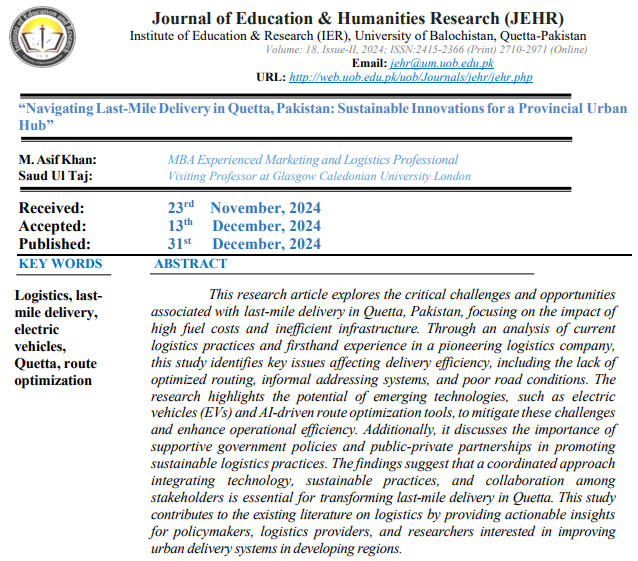Navigating Last-Mile Delivery in Quetta, Pakistan: Sustainable Innovations for a Provincial Urban Hub
Keywords:
Logistics, last-mile delivery, electric vehicles, Quetta, route optimizationAbstract
This research article explores the critical challenges and opportunities associated with last-mile delivery in Quetta, Pakistan, focusing on the impact of high fuel costs and
inefficient infrastructure. Through an analysis of current logistics practices and firsthand experience in a pioneering logistics company, this study identifies key issues affecting delivery efficiency, including the lack of optimized routing, informal addressing systems, and poor road conditions. The research highlights the potential of emerging technologies, such as electric vehicles (EVs) and AI-driven route optimization tools, to mitigate these
challenges and enhance operational efficiency. Additionally, it discusses the importance of supportive government policies and public-private partnerships in promoting sustainable logistics practices. The findings suggest that a coordinated approach integrating
technology, sustainable practices, and collaboration among stakeholders is essential for transforming last-mile delivery in Quetta. This study contributes to the existing literature on logistics by providing actionable insights for policymakers, logistics providers, and
researchers interested in improving urban delivery systems in developing regions.
References
Gevaers, R., Van de Voorde, E., s Vanelslander, T. (2014). "Cost modeling of last-mile logistics: A case study in the urban context." Transportation Research Part E: Logistics
and Transportation Review, 71, 210-227.
Esper, T. L., Williams, L. R., s To, M. (2003). "Last-mile delivery: Lessons learned from urban logistics." Transportation Research Record: Journal of the Transportation Research Board, 1836(1), 132-140.
Lin, P., s Zhang, M. (2016). "A new approach for solving the last-mile delivery problem." Operations Research Letters, 44(4), 424-428.
Johnson, M. s McCormick, D. (201G). "Technology integration in logistics: The impact of IoT." Logistics Research, 12(1), 1-10.
Janjevic, M. s Ndiaye, A. (2014). "Green logistics in the urban context: The role of electric vehicles." European Transport Research Review, 6(3), 193-205.
Munoz, A. s Dittmar, H. (2020). "Challenges of last-mile delivery in urban settings: The case of Nairobi." International Journal of Logistics Research and Applications, 23(1), 57-75.
Das, A. s Bhatnagar, R. (2021). "Last-mile delivery challenges in South Asia." Journal of Urban Logistics, 4(2), 177-195.
Gonzalez-Feliu, J., Morana, J., s Saidi-Mehrabad, M. (2017). "The role of address systems in urban freight transport." Sustainability, 9(8), 1365.
Zanoni, S. s Zavanella, L. (2020). "Crowdsourcing last-mile delivery: A review of emerging practices." Logistics, 4(3), 24.
McKinnon, A. C., Browne, M., s Whiteing, A. (2015). "Green logistics: Improving the environmental sustainability of logistics." Kogan Page Publishers.
Cherrett, T. J., McLeod, F., s Allen, J. (2017). "Assessing the environmental benefits of electric vehicles in urban deliveries." Transport Policy, 60, 68-75.




